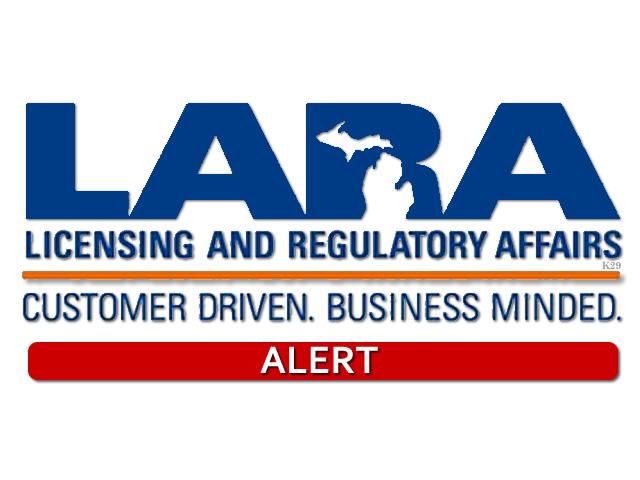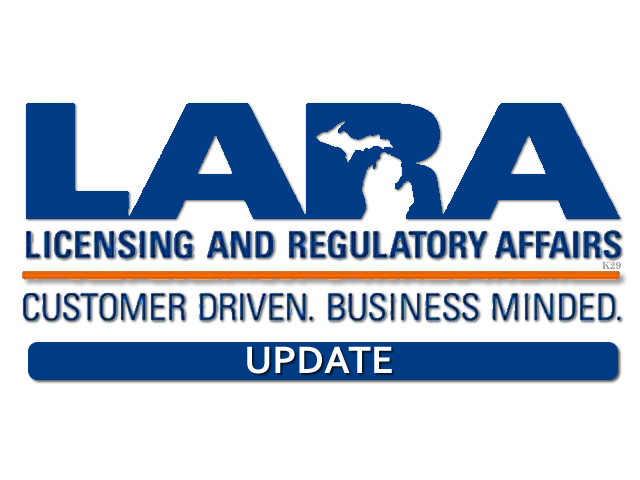
Jul 19, 2018 | Blog, LARA-MMFLA Info, Michigan Medical Marhuana Regulation
LARA-MMFLA – ADVISORY BULLETIN
July 17, 2018
This advisory bulletin does not constitute legal advice and is subject to change. Licensees are encouraged to seek legal counsel to ensure their operations comply with the Medical Marihuana Facilities Licensing Act and associated
Emergency Rules.
30-Day Transition Period (Emergency Rule #20)
Emergency Rule 20 allows for a transition period of 30 calendar days during which marihuana product can be entered into the statewide monitoring system to ensure statewide tracking. These 30 days begin on the day a state operating license is issued to a licensee for the first time (the only exception is for additional licenses issued to the same license holder for a stacked license after a first license has already been issued).
Within those 30 days, a licensee shall:
- Comply with ALL testing requirements as prescribed by the act and rules, including moisture content, potency analysis, foreign matter inspection, microbial and mycotoxin screening, chemical residue, metals screening, residual solvents levels and water activity.
- Record all marihuana product in the statewide monitoring system and tag or package all inventory that has been identified in the statewide monitoring system.
The above requirements pertain to all marihuana and marihuana-infused products remaining in inventory at the time of licensure.
After the 30-calendar-day period, any marihuana product that has not been identified in the statewide system under these rules and the Medical Marihuana Facilities Licensing Act (MMFLA) is prohibited from being onsite at a marihuana facility.
A violation of this rule may result in sanctions and/or fines. At any time during this 30-calendar-day period, and thereafter, a marihuana facility is subject to inspection.
Additional information relating to the statewide monitoring system can be found in the This advisory bulletin does not constitute legal advice and is subject to change. Licensees are encouraged to seek legal counsel to ensure their operations comply with the Medical Marihuana Facilities Licensing Act and associated
Emergency Rules.
MMFLA Sections 501 and 502 provide that growers and processors must use a secure transporter to transport marihuana unless the facilities are within the same location and public roadways are not used.
Additionally, the MMFLA specifies that – prior to Dec. 31, 2018 – growers and processors have 30 days once their license is issued to transfer marihuana plants, seeds, and seedlings if they are lawfully possessed by an individual formerly registered as a primary caregiver who is an active employee of the grower or processor.
This 30-day period coincides with the 30-calendar-days given for licensees to enter items into the statewide monitoring system.
Read the full Release
Komorn Law has represented numerous clients through the legal chaos of starting up a business in the Michigan Medical Marihuana Industry.
Contact Us For More Information.
800-656-3557

Jul 19, 2018 | Blog, LARA-MMFLA Info, Michigan Medical Marhuana Regulation
Updated Forms for Medical Marihuana Registry Identification Card Now Available
July 9, 2018 – Updated MMMP Form.
Michigan residents may apply for a Michigan Medical Marihuana Program Registry Identification Card if they have been diagnosed with any of the 11 new qualifying conditions approved today by LARA Director Shelly Edgerton.
Updated application packets for Michigan residents 18 years and older and for those under the age of 18 are now available on the Bureau of Medical Marihuana Regulation (BMMR) website. The following conditions have been added to the physician certification form in the updated application packet:
- Arthritis
- Autism
- Chronic Pain
- Colitis
- Inflammatory Bowel Disease
- Obsessive Compulsive Disorder
- Parkinson’s
- Rheumatoid Arthritis
- Spinal Cord Injury
- Tourette’s Syndrome
- Ulcerative Colitis
Applicants are reminded of the following when applying for a registry identification card:
- Patients should only send one complete application and then wait for a response from BMMR. If duplicate applications or miscellaneous documents are submitted, the application may be denied, or its processing delayed.
- Patients should not allow other individuals or third parties to submit their applications or any other documents to the MMMP as patients will be unable to determine when or if their applications were submitted.
- Patients should not allow other individuals or third parties to retain copies of their documents, state-issued driver licenses, personal identification cards, or voter registrations as that increases the possibility of fraudulent submissions.
- The Michigan Medical Marihuana Program (MMMP) is not affiliated with any third-party business operations, “dispensaries,” provisioning centers, caregivers, or certifying physicians and is not associated with any business operation that uses the terms “Michigan Medical Marihuana Program” or “MMMP” in their name or advertising.
- Applicants often receive inaccurate information from third parties that result in their applications being delayed or denied.
- Third-party business operations which tell patients that their application and physician certification serve as a temporary registration card are putting the patients at risk of possible arrest. According to state law, patients or caregivers must present their valid registry identification card and a valid driver license – or government-issued identification card with photo – to law enforcement to be protected from arrest.
- BMMR recommends that applicants wait until they receive a registry card before engaging in the medical use of marihuana.
While there are currently no licensed provisioning centers in the state of Michigan, patients who wish to acquire medical marihuana or medical marihuana-infused products from licensed provisioning centers in the future will need to present a valid registry identification card at the time of purchase.
Komorn Law has represented numerous clients through the legal chaos of starting up a business in the Michigan Medical Marihuana Industry.
Contact Us For More Information.
800-656-3557


